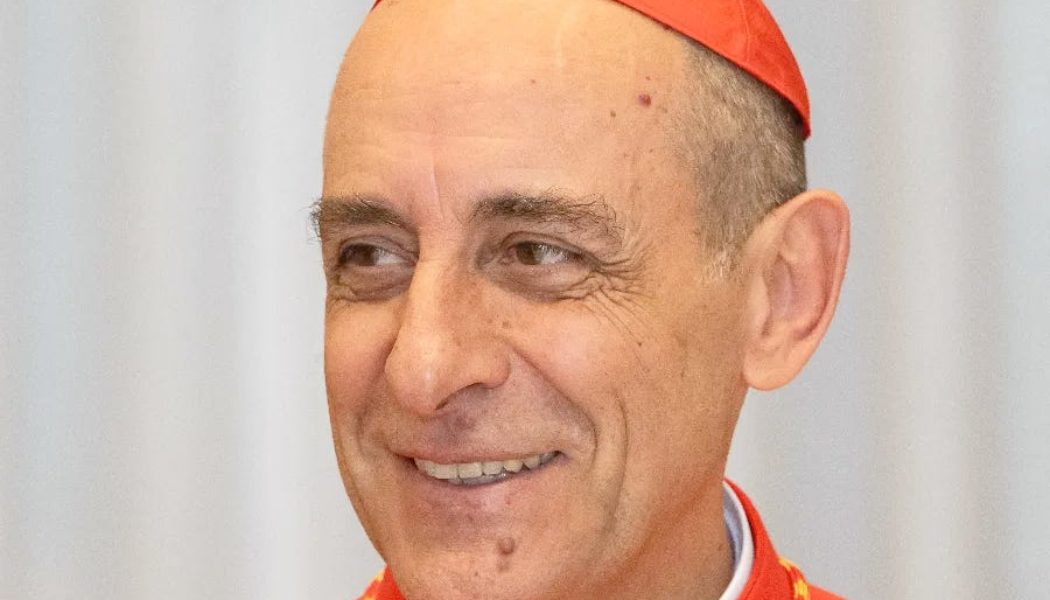Church leaders have been in the grip of sharp debate this week, after the Vatican’s Dicastery for the Doctrine of the Faith published on Monday Fiducia supplicans, a declaration which offered a framework for clerical blessings of same-sex couples, and others living in relationships outside of marriage.

Some bishops’ conferences and dioceses which had already given a green light to such blessings, in Belgium and Germany especially, saw in the document a validation of their approach to the issue, with some promising to defy the document by publishing guidelines for the liturgical blessings of same-sex couples — a step prohibited by the DDF’s declaration.
But some bishops’ conferences in Africa and Asia pushed back on the document, with some prohibiting the implementation of Fiducia supplicans in their territory. One cardinal challenged the doctrinal orthodoxy of the document, while the head of the Ukrainian Greek Catholic Church said the text does not apply to his congregation.
Amid a challenging week for the Church, The Pillar contacted Cardinal Víctor Manuel Fernández, prefect of the Dicastery for the Doctrine of the Faith, with questions about the document, and the reactions it has generated.
This interview was conducted in Spanish, by email, and was translated by The Pillar.
Cardinal Fernandez, Fiducia supplicans says that it ‘remains firm on the traditional doctrine of the Church about marriage, not allowing any type of liturgical rite or blessing similar to a liturgical rite that can create confusion.’
It also states that the blessings it discusses ‘should not be fixed ritually by ecclesial authorities to avoid producing confusion with the blessing proper to the sacrament of marriage,’ and that ‘these non-ritualized blessings never cease being simple gestures that provide an effective means of increasing trust in God on the part of the people who ask for them, careful that they should not become a liturgical or semi-liturgical act, similar to a sacrament.’
But various bishops’ conferences have approved rituals for blessing couples in irregular situations.
Does that contradict the declaration?
The declaration is very clear in distinguishing the two forms of blessing: one with a liturgical-ritual format and the other proper to pastoral work — this is its specific contribution.
Some episcopates had advanced in ritualized forms of blessing irregular couples, and this is inadmissible. They should reformulate their proposal in that regard.
Fiducia supplicans says that: ‘In a brief prayer preceding this spontaneous blessing, the ordained minister could ask that the individuals have peace, health, a spirit of patience, dialogue, and mutual assistance—but also God’s light and strength to be able to fulfill his will completely.’
It adds that: ‘These forms of blessing express a supplication that God may grant those aids that come from the impulses of his Spirit—what classical theology calls ‘actual grace’—so that human relationships may mature and grow in fidelity to the Gospel, that they may be freed from their imperfections and frailties, and that they may express themselves in the ever-increasing dimension of the divine love.’
Do those passages mean that the primary motivation for giving such a blessing has to be that the couple in an ‘irregular situation’ conform their lives to the moral and doctrinal teachings of the Church?
These kinds of blessings are simply simple pastoral channels that help to express people’s faith, even if those people are great sinners.
Therefore, by giving this blessing to two people who spontaneously come forward to request it, one can legitimately ask God to grant them health, peace, prosperity—the things that we all ask for and that a sinner can also ask for.
At the same time, since one can think that in the daily lives of these two persons, not everything is sin, one can therefore pray for them [to receive] a spirit of dialogue, patience, mutual help.
But the declaration also mentions a request for help from the Holy Spirit so that this relationship, which is often unknown to the priest, may be purified of everything that does not respond to the Gospel and the will of God, and may mature along the lines of God’s plan.
As I was saying, sometimes the priest, on a pilgrimage, does not know that couple, and sometimes they are two very close friends who share good things, sometimes they had sexual relations in the past and now what remains is a strong sense of belonging and mutual help. As a parish priest, I have often met such couples, who are sometimes exemplary.
Therefore, since it is not a question of the sacrament of confession(!), but of a simple blessing, it is still asked that this friendship be purified, matured and lived in fidelity to the Gospel. And even if there was some kind of sexual relationship, known or not, the blessing made in this way does not validate or justify anything.
Actually the same thing happens whenever individuals are blessed, because that individual who asks for a blessing — not absolution — may be a great sinner, but we do not deny a blessing to him.
But clearly we have to grow in the conviction that non-ritualized blessings are not a consecration of the person, they are not a justification of all his actions, they are not a ratification of the life he leads. No. No. I do not know at what point we have so exalted this simple pastoral gesture that we have equated it with the reception of the Eucharist. That is why we want to set so many conditions for blessing.
The statement says that ‘beyond the guidance’ it provides, ‘no further responses should be expected about possible ways to regulate details or practicalities regarding blessings of this type.’
Does that mean that there will not be any response, or reprimand, to episcopal conferences or dioceses which seek to regulate and ritualize these blessings — or to those which seek to prohibit them altogether?
No, it means that one should not expect a manual, a vademecum, or a guide for something so simple.
I know that in some dioceses, bishops in the past have established guidelines for these cases. For example, some have indicated to priests that when it is a matter of a couple well-known in the place or in cases where there could be some scandal, the blessing should be given in private, in an discreet place. But this declaration did not want to go into details or replace the local discernment of the bishops.
On the other hand, trying to interpret your question, we are currently discussing these issues with presidents of bishops’ conferences and with groups of bishops visiting the dicastery. Soon, a group of dicastery prefects will begin a journey of conversion and deepening with the German bishops and we will make all the necessary clarifications.
Moreover, I am planning a trip to Germany to have some conversations that I believe are important.
The declaration appeals to the ‘practical’ and ‘prudent and fatherly’ discernment of priests to impart these blessings.
Does that approach diminish the authority of bishops to govern their diocese, as follows from the ecclesiology of the Second Vatican Council — especially its emphasis on the authority of diocesan bishops?
Are the bishops who have prohibited these blessings in their territories directly contradicting the declaration?
Each local bishop, by his own munus, has always had the function of discernment in loco, in that very concrete place that he knows more than others, because it is his flock.
We do not speak of the national [bishops’] conferences, and even less of the continental ones, because they cannot impose things to the bishops in their dioceses. Even if they can unify criteria, they cannot replace the unique place of the bishop incarnated in his local Church.
But we are in the Catholic Church, and there the Gospel shows us Peter.
Obviously, when there is a text signed by the pope, in order to interpret it broadly, the bishops must first study it in depth and without haste, and allow themselves to be enlightened and enriched by that text. Therefore, prudence and attention to local culture could admit different ways of application, but not a total denial of this step being asked of priests.
I well understand the concern of the bishops in some African or Asian countries, in places where being gay might put you in prison. It is an affront to human dignity that certainly distresses the bishops, and challenges them in their fatherhood. It is likely that the bishops do not want to expose homosexual persons to violence. They themselves refer to the “legislation” of their countries.
What is important is that these bishops’ conferences are not holding a doctrine different from that of the declaration signed by the pope, because it is the same doctrine as always, but rather they state the need for study and discernment, in order to act with pastoral prudence in this context.
I cannot say more than this because I recognize that the reception of these documents requires time, and a serene and prolonged reflection.
One interpretation that has been given to the declaration is that the blessings would be imparted on persons and not on their union specifically. However, the document clearly speaks in its third part of blessing ‘couples.’
Does this imply that the ‘irregular’ union of these persons is being blessed?
It is necessary to distinguish well, and the declaration makes this distinction. Couples are blessed. The union is not blessed, for the reasons that the declaration repeatedly explains about the true meaning of Christian marriage and sexual relations.
For those who read the text serenely and without ideological prejudices, it is clear that there is no change in the doctrine on marriage and on the objective valuation of sexual acts outside the only [kind of] marriage which exists — male-female, exclusive, indissoluble, naturally open to the generation of new life).
But this does not prevent us from making a gesture of paternity and closeness, otherwise we can become judges who condemn from a pedestal — when we consecrated men have much that humiliates us as a Church, we have given serious scandal to the simple ones with our behavior.
Besides, we all have our personal faults, we are not fully coherent with the whole Gospel, and our lapidary judgments sometimes do not take into account that the same measure we use for others will be used with us. I, who want to go to Heaven and be very happy with God eternally, try not to forget this warning of Jesus Christ.
Comments 51
Services Marketplace – Listings, Bookings & Reviews




